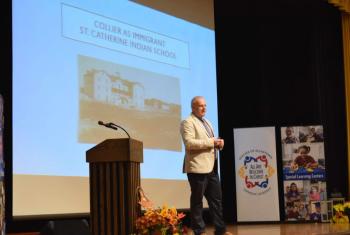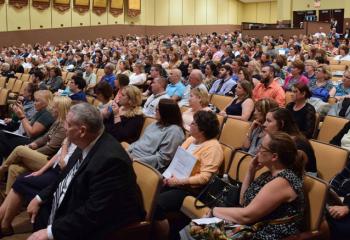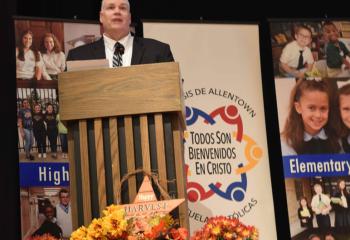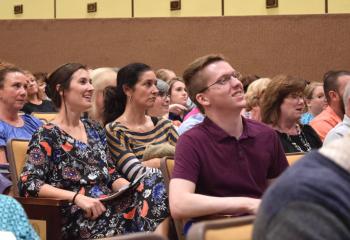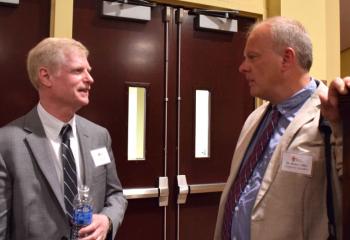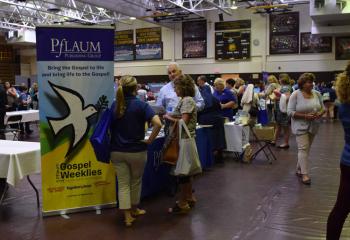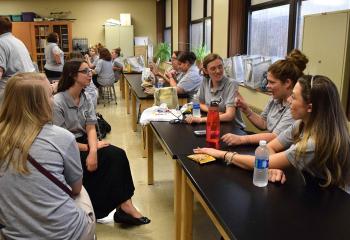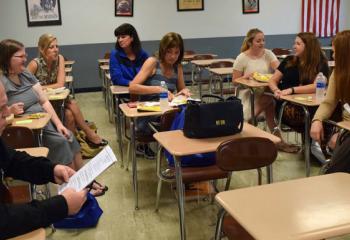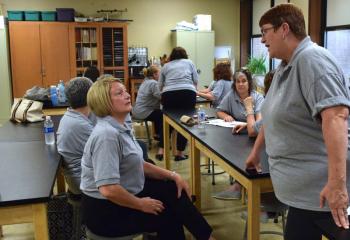By TARA CONNOLLY Staff writer
“There is a long history of immigration in this nation. The idea that we are facing something new is simply not true. Immigrants have always been part of this nation and there has always been immigration right here in this diocese,” said Brian Collier Oct. 9 during the Diocese of Allentown Education Convention at Bethlehem Catholic High School.
Collier, director of the American Indian Catholic Schools Network and coordinator of supervision for the Alliance for Catholic Education at the University of Notre Dame, gave the keynote address at the convention “All are Welcome in Christ.”
Collier focused on the challenges of welcoming immigrants during his talk, “The Native and the Immigrant,” and brainstormed with the estimated 1,000 educators on devising better methods.
“Most of us here are probably immigrants. People aren’t always what they seem or look like,” noted Collier.
Collier began his career in education for the Sisters of the Blessed Sacrament at St. Catherine Indian School in Santa Fe, New Mexico, and said he found success by teaching the kids in “front” of him.
“You have to be culturally responsive to the kids in front of you,” he stressed.
To do so, Collier said, being “culturally responsive” can be tricky and could be misunderstood as racism or stereotyping.
He then asked educators for suggestions, which included viewing the child as a whole person, encouraging them to share their culture and traditions, and learning to pronounce their names properly.
Noting that the convention fell on the same date as Columbus Day, Collier pointed out that the natives could have killed Columbus but chose to welcome him.
“Today we are paying attention to a huge influx of immigrants into the United States. We are ready as a nation to embrace a new wave of immigrants. Our society is ready to embrace lots of cultures,” he said.
Although the United States is ready, Collier said history cannot be erased. He pointed out that President John Adams’ policies made it difficult for immigrants to become citizens, and the Chinese Exclusion Act in 1882 was first law implemented to prevent a specific ethnic group from immigrating to the United States,
“We literally turned boats of Jews around and back to Adolf Hitler. We remember that with great shame,” he said.
Collier also warned educators against playing the “nostalgia game” by contending that Catholics schools were “better back in the day.”
“Things have been changing for a long time in your community. But in actuality things are changing less now than a century ago,” he said.
He pointed out that immigrants made up 14.7 percent of the population in 1910 and 12.9 percent in 2010.
“Most of this stuff isn’t new. The only difference is the new immigrant isn’t white. We were accustomed to welcoming immigrants that looked like us,” said Collier.
He advised the educators to heed the example St. Katharine Drexel, who offered welcome and hospitality to the “stranger” and worked to help them preserve their cultures and heritage.
“My challenge to you is what narrative are you going to promote? Is it all black and white,” asked Collier.
“If we are only promoting one narrative – we are leaving people out. When we do that, we go against our first teacher – Jesus Christ,” he said.
The convention also featured a morning keynote address, “Providing an Atmosphere of Welcome for a New Generation of Students and Parents,” by Father Joseph Corpora, associate director of Latino Student Ministry at Notre Dame.
The day began with Mass celebrated by Bishop of Allentown Alfred Schlert and concelebrated by diocesan priests.
More than 50 exhibits and vendors were on hand, including the Crayola Experience, Our Sunday Visitor, First in Math, Christmas City Studios and National Museum of Industrial History.
Cat Country 96 Radio Station broadcasted a live remote from the convention and gave away prizes to educators who spun the “Wheel of Whiskers.”



